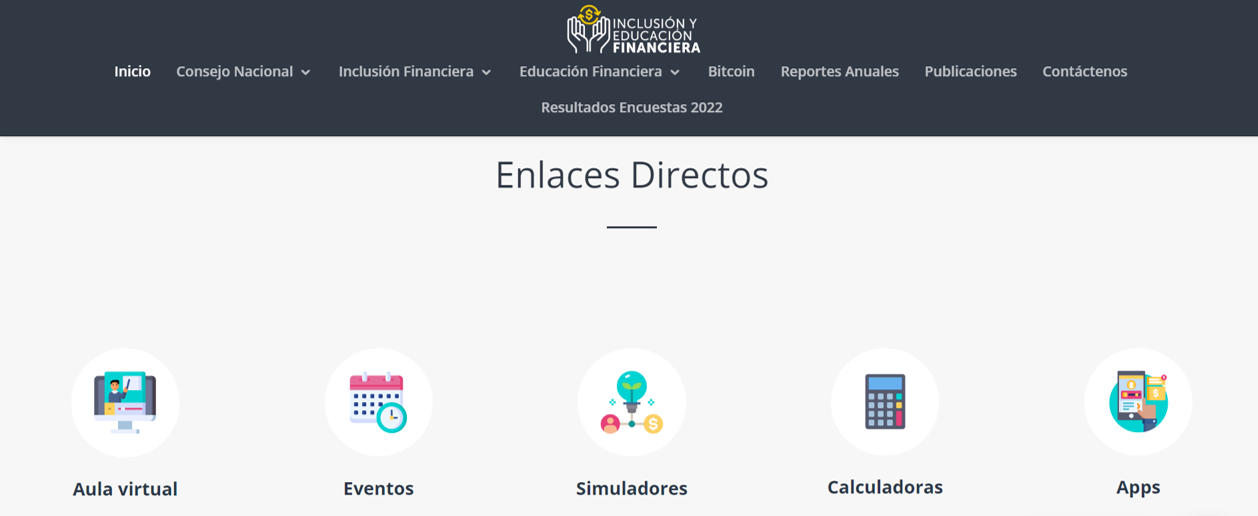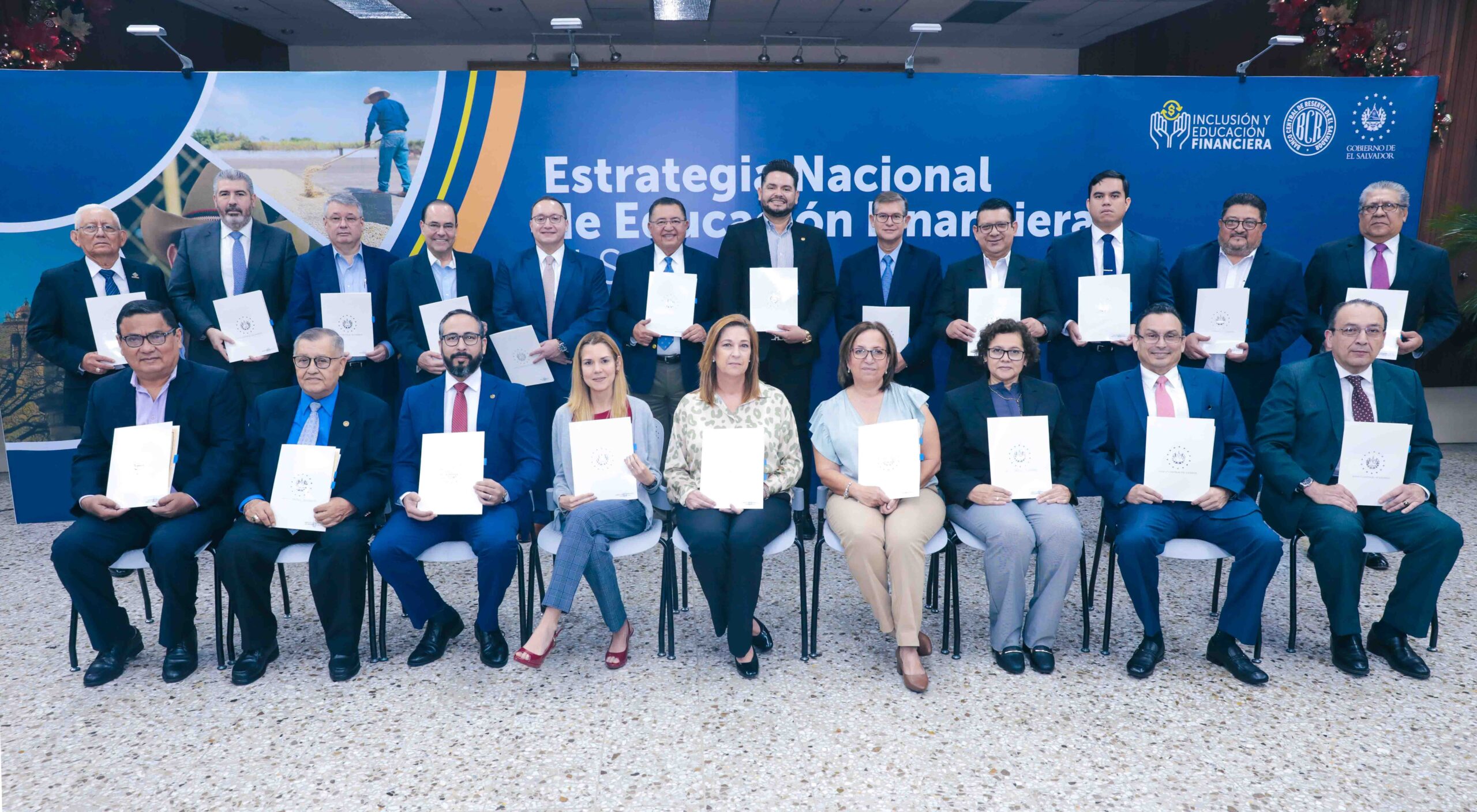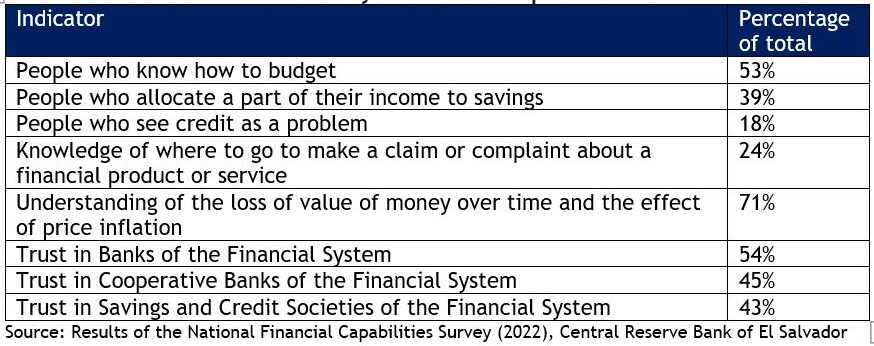This English version of the blog is a translation of the original text written in Spanish. Click here to read the Spanish version. (Esta versión en inglés del blog es una traducción del texto original escrito en español. Haga clic aquí para leer la versión en español.)
How a joint effort to promote the benefits of financial education gave birth to El Salvador’s first National Financial Education Strategy and a near 15 percent drop in its financial education gap.
By Eugenia Pineda, Analyst of the Public Policy and Financial Innovation Department, Banco Central de Reserva de El Salvador.
In 2019, in response to the lack of financial inclusion and education, El Salvador established the National Council for Financial Inclusion and Education (“Consejo Nacional de Inclusión y Educación Financiera” or CNIEF) under Executive Decree No. 18. Coordinated by the Banco Central de Reserva de El Salvador (BCR) and made up of ten member institutions, the CNIEF was responsible for formulating, implementing and monitoring both a national financial inclusion policy and a national financial education strategy. Additionally, it was tasked with identifying innovative policy initiatives, establishing policy objectives, and aligning strategies and work plans of member institutions.
One of the first major outcomes of the Decree was the creation of the National Policy for Financial Inclusion (“Política Nacional de Inclusión Financiera” or PNIF) in 2021. A key priority of the PNIF has been consumer empowerment and protection, which naturally gave way to significant advances in financial education – including the country’s first National Financial Education Strategy.
National Financial Education Strategy
In 2016, with the support of the Alliance for Financial Inclusion (AFI), the Banco Central de Reserva de El Salvador carried out the National Financial Capabilities Survey (2016) in order to accurately assess the state of financial education in the country. The survey indicated that 49 percent of the Salvadoran population considered credit problematic and that 94 percent lacked any form of financial education. The survey results also helped set up a Financial Education Indicator which pointed to a score of 10.3 out of 21 points – revealing a financial education gap of 10.7 points in 2016.
In August 2022, after President Nayib Bukele approved a public policy addition to the PNIF aimed at promoting the benefits of financial education in daily lives, various state organizations got on board, initiating a coordinated effort to improve the economic well-being of all citizens.
The existing needs and challenges identified via the 2016 survey guided the CNIEF in formulating a National Financial Education Strategy (“Estrategia Nacional de Educación Financiera” or ENEF). The strategy was launched in October 2022, with the participation of banks, cooperatives, savings and credit societies, private financial education initiatives, and the general population. The ENEF’s action plan consists of 81 activities, divided into the following three strategic areas:
- Priority segments: In order to reduce the financial inclusion and education gaps in gender, age, geographic area, and income level, the ENEF prioritizes certain segments of society including the education sector; micro, small and medium enterprises and businesses; the salaried population; migrant communities; and vulnerable groups (women living in poverty, youth at social risk, and recipients of government transfers).
- Cross-cutting: This refers to comprehensive, transversal actions oriented towards gender equality and non-discrimination, and the use of digital currency such as bitcoin, which El Salvador adopted as legal tender in 2021. Cross cutting is aimed at reducing existing gender gaps in financial empowerment, which in turn will contribute to poverty reduction, economic growth, and sustainable development in El Salvador.
- Communication and accessibility: The ENEF aims to emphasize the importance of financial education and related activities and make it more accessible to key stakeholders and the Salvadoran population.
The ENEF’s existing activities are complimented by additional initiatives, for example, the creation of the financial inclusion and education website. Here users have access to a virtual classroom with courses provided by CNIEF member institutions; interactive financial calculators; apps that facilitate personal finance management; interactive games on financial education for children; annual scheduling of webinars on financial education; a bitcoin course; and comprehensive information on the main advances in financial inclusion and education in El Salvador. The website also includes content on financial simulators linked to savings and budgeting.
 Financial Inclusion and Education website
Financial Inclusion and Education website
Source: https://inclusionfinanciera.gob.sv/
Technical Cooperation Agreement on financial inclusion and education
In October 2022, the Banco Central de Reserva de El Salvador and 20 other supervised financial institutions signed a Technical Cooperation Agreement on financial inclusion and education. With the support of the Central Bank, the agreement aims to coordinate financial institutions’ efforts in the creation of financial education programs as well as in providing financial education facilitators access to a virtual classroom for training purposes. The signatory entities committed to submit statistical information in compliance with the provisions set out in the NASF-10 Technical Standards for the Submission of Information on Financial Education Programs or Initiatives. The standards have been applicable since October 2022 as part of reforms to the Law to Facilitate Financial Inclusion.
 Signing of the Technical Cooperation Agreement
Signing of the Technical Cooperation Agreement
Source: Banco Central de Reserva (2022)
National Financial Capabilities Survey 2022
In 2022, the National Financial Capabilities Survey (2022) was conducted with the support of AFI to monitor and evaluate the implementation of the ENEF in El Salvador, thereby updating the Financial Education Indicator accordingly. The Banco Central de Reserva de El Salvador presented the main results of the survey in November 2022:
Some results of the National Survey of Financial Capabilities 2022

The Financial Education Indicator has increased to 11.75 points in 2022 – that’s a 14% improvement compared to 2016. The success was largely due to coordination among institutions in promoting financial education activities and implementing those activities across a greater extent of the Salvadoran population. These activities included financial education training, talks, webinars, workshops and courses, countrywide financial education fairs, and savings and microenterprise simulators, among others.
In conclusion, the progress achieved through El Salvador’s ENEF can be attributed to the coordinated effort of all actors involved in promoting the financial and social well-being of Salvadorans by encouraging the dissemination and implementation of basic but crucial financial knowledge, consequently positively impacting their long-term financial attitudes and behavior.
AFI’s Financial Education Programs Monitoring & Evaluation Toolkit and complementary Financial Capability Barometer provide practical steps, tips, examples, and checklists to guide key stakeholders through the process of assessing the performance of national financial education, literacy and capability programs, as well as conducting accountability of the resources deployed to different programs.

 About
About
 Online
Online
 Data
Data












 Financial Inclusion and Education website
Financial Inclusion and Education website







